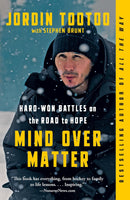Description
Jordin Tootoo is of Inuit and Ukrainian descent and made history as the first Inuk NHL player to be raised in Nunavut and to be drafted by the NHL. Over his 13-year career, he played for the Nashville Predators, Detroit Red Wings, New Jersey Devils, and Chicago Blackhawks, banking 161 points, including 65 goals, in 723 career games. A trailblazer both on and off the ice, Tootoo has since become a vocal mental health advocate dedicated to giving back to his communities. He speaks to the power of creating a culture of inspired inclusivity and explores what real teamwork looks like, both at home and work. He played for the Brandon Wheat Kings in the Western Hockey League (WHL) from 1999 to 2003 and was drafted by the Nashville predators in the 2001 NHL Entry Draft. Tootoo was nominated for the NHL Foundation Player Award in 2015, which recognizes players who enrich the lives of people in their community. He announced his retirement from the sport in 2018. As an Indigenous athletic leader, Tootoo has long understood his responsibility as a role model and speaks openly about the need to fight the stigma around mental illness and to provide more mental health support. He founded the Team Tootoo Foundation in honour of his late brother Terence, to provide grants to various charities for suicide prevention and at-risk youth. In 2016, Tootoo was awarded a Meritorious Service Medal through the Order of Canada in recognition of his work.
Following on the bestselling success of the inspiring All the Way, pioneering Inuit NHLer Jordin Tootoo, the first Inuk hockey player to play in the NHL, begins the process of healing in the wake of the suicide and violence that marked his family, only to discover the source of all that trauma in his father’s secret past.
For some hockey players, retirement marks the moment when it’s all over. But Jordin Tootoo is not most hockey players.
Having inspired millions when he first broke into the league, Tootoo continued to influence people throughout his career—not only through his very public triumph over alcoholism, but also his natural charisma. And now, years after hanging up his skates, he is more committed to doing things the right way and speaking about it to others, whether it’s corporate executives or Indigenous youth.
But the news of unmarked graves on the grounds of residential schools brought back to life many of the demons that had haunted his family. In a moment of realization that left him rattled and saddened, Tootoo fit the pieces together. The years that were never spoken of. The heavy drinking. The all too predictable violence. His father was a survivor, marked by what he had survived.
And, Tootoo realizes, his community is marked in the same way. Its joy too often sapped away by alcoholism, its youth all too often cut down by suicide—as his brother had been. As he travels back to Nunavut to try to speak with his father about what haunts him, he encounters the ghosts of the entire community.
Still, as Tootoo says, we are continuously learning and rewriting our story at every step. He has learned from his mistakes and his victories. He has learned from examples of great courage and humility. He has learned from being a father and a husband. And he has learned from his own Inuk traditions, of perseverance and discipline in the face of hardship.
Weaving together life’s biggest themes with observations and episodes, Jordin shares the kind of wisdom he has had to specialize in—the hard-won kind.


